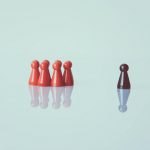
It’s New Year’s Eve and you’re at a bar enjoying a cocktail party, talking with a friend, or date. Party music is blasting, glasses are toasting, champagne is popping, and all around you are dozens of conversations along the lines of “No, seriously! This year will be the year my gym membership survives until February!” In such a noisy environment, isn’t it amazing that we can somehow tune out all those other noises and focus on the person in front of us? You can say thanks to the “cocktail party effect” for that!
What is The Cocktail Party Effect?
Sometimes called “selective hearing” or “selective attention,” the cocktail party effect is a phenomenon that refers to our ability to focus on one specific auditory stimuli while filtering out others.
It also can refer to a similar phenomenon where highly pertinent stimuli (such as our name) can immediately grab our attention, despite not previously paying the conversation any attention at all.
First defined in 1953 by Colin Cherry, he conducted a series of experiments to better understand auditory attention. One set of experiments had participants wear a special headset that played different messages to each ear. The participant was asked to focus on the message and repeat it aloud. Cherry found that despite focusing on the message in one ear only, participants heard and detected their name when it was said in the unfocused ear!
Later research by Neville Moray in 1959 further compounded these findings, and he was able to conclude that only subjectively important messages (such as names) would pass through this mental focus block.
The Cocktail Party Problem?
No, we’re not talking about the bottomless mimosas night at your local bar or restaurant. The cocktail party problem, sometimes called cocktail party deafness, refers to the opposite of the cocktail party effect; where speech discrimination is markedly diminished as a result of background noise.
Studies show that not only humans, but animals face these same problems. Animals also solve these problems as well, in ways that are closely related to the human cocktail party problem. So what does that mean for us?
Well, our best bet to understanding this phenomenon may in fact be from studying insects, frogs, and songbirds!

If you’re interested in other hearing loss articles or information, take a look at the many articles on our blog!
The information in this guide has been written using the following reliable sources: https://www.audiology.org, https://link.springer.com, https://books.google.co.jp, https://www.ncbi.nlm.nih.gov








